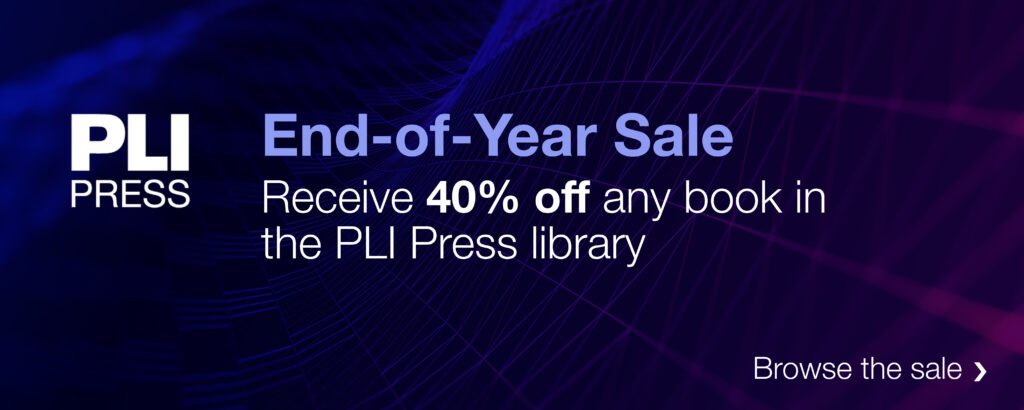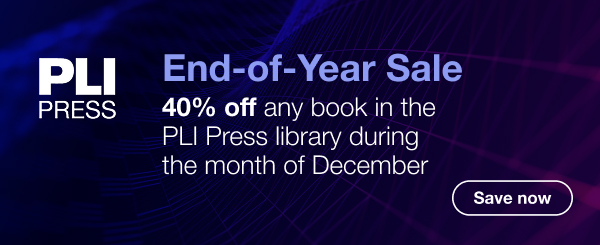
Browse our collection today and save big now through the end of December!

Browse our collection today and save big now through the end of December!

Browse our collection today and save big now through the end of December!

PLI Press is proud to announce the publication the brand-new treatise Artificial Intelligence & Intellectual Property.
Over the past decade, artificial intelligence (AI) technologies have rapidly evolved from experimental curiosities to pivotal drivers of innovation, creativity, and economic growth. In fields ranging from healthcare to entertainment, AI systems are generating outputs that challenge traditional notions of authorship, inventorship, ownership, and liability. Today, legal practitioners, scholars, businesses, and governments worldwide are grappling with profound questions: Does AI-generated work qualify for copyright protection? Can an algorithm be considered an “inventor” under patent law? How do we protect data when AI systems rely on massive datasets? Who is held responsible when AI-based decisions infringe on IP rights or cause tangible harm?
Artificial Intelligence & Intellectual Property provides an authoritative, yet accessible, resource for those navigating these uncharted legal waters. AI & IP explores the intersection of AI and every branch of intellectual property, offering insights that can guide future legal reasoning, policy making, and practical decision making.
A team of experts addresses a wide range of topics, including:
Each chapter can stand alone for a focused dive into its specific area, but taken together, they form a cohesive examination of the ethical, legal, and practical dilemmas that AI brings.
Order a print copy today.
PLI PLUS subscribers can access this title through their subscription.

Fintech, Regtech, and the Financial Services Industry offers a comprehensive exploration of how innovations in securities trading and payment systems are reshaping the financial landscape. Through contributions from seasoned professionals, the book highlights emerging trends, regulatory developments, and the opportunities these changes present for market participants. This timely volume serves as a vital resource for understanding the intersection of finance, technology, and regulation in a rapidly shifting environment.
Highlights of this seventh release include:
Order a print copy today.
PLI PLUS subscribers can access this title through their subscription.
Practising Law Institute (PLI) is pleased to announce our first call for law student papers.
The PLI Chronicle is an open-access periodical available exclusively on PLI PLUS, the award-winning legal research platform of PLI Press. The Chronicle delivers timely and relevant discussions on hot topics — from laws, regulations, and policies, to industry developments and cutting-edge issues, to commentary on working in the legal and accounting industries. Check out the latest edition of the PLI Chronicle here.
Writing for the PLI Chronicle gives law students a direct line to PLI’s extensive userbase of 450,000 legal professionals — including 95% of Am Law 100 members, educators, government regulators, and thought leaders. This is a great opportunity for students looking to amplify their voices and connect with the minds that shape today’s legal landscape.
Topic: Emerging Discussions Around Artificial Intelligence
For this call for papers, the PLI Chronicle is seeking submissions that explore student perspectives on the intersection of artificial intelligence (AI) and the law. PLI invites submissions from students currently enrolled in law school.
Potential topics include — but are by no means limited to —
DATES
The submission deadline is September 19, 2025. If selected for publication, you must be available for a brief editorial review process in late September/early October. The chosen publication(s) will be published in the October edition of the journal.
APPLY
We seek submissions that are no more than 2,500 words. Please submit your article as a Word file.Please do not include footnotes. Hyperlinks to outside sources are welcome.
Please email your article and a brief CV/resume by September 19, 2025, to Victoria Bonacasa, Publishing Coordinator, at vbonacasa@pli.edu. Please also state your law school and your graduation year.
Selected publications will be published in the PLI Chronicle and made available to public readership. Authors will retain copyright of their submissions but grant PLI a two-week exclusive license to publication. Contributors to the PLI Chronicle will have the ability to link directly to the article on PLI PLUS. If you have any questions, please contact Victoria Bonacasa at vbonacasa@pli.edu.

PLI Press is proud to announce the publication of the new treatise Decrypting Crypto: Digital Assets and Web3 Explained.
This brand-new treatise serves as a comprehensive resource to help equip lawyers with the technical knowledge and legal context needed to understand the Web3 industry and the unique issues and challenges it creates for lawyers and clients alike
Decrypting Crypto: Digital Assets and Web3 Explained is organized into three parts:
Part I, Technical Fundamentals, provides technical background and explains the key components, systems, and tools that help comprise Web3.
Part II, Federal Agencies and Regulatory Oversight, is about the primary U.S. federal agencies that regulate crypto. In the absence of any major crypto-specific legislation, these agencies play a pivotal role in shaping the law for Web3.
Part III, Practical Issues, is targeted at attorneys in particular legal areas so that they will understand the issues that may arise in their specific practice.
We are excited to share this new title with you!
Order a print copy today.
PLI PLUS subscribers can access this title through their subscription.

PLI Press is proud to announce the publication of the new practice guide Knowledge Management & Innovation: A Manual for Law Firms and Other Legal Services Organizations.
This book is a comprehensive resource for knowledge management and innovation (KM&I) professionals in the legal industry. It offers best practices for achieving common KM&I goals and includes several checklists and other practice forms which can be used to help organizations and law firms implement beneficial KM&I procedures. The book presents its knowledge management concepts within a broad framework and historical context while also covering the most recent developments.
Notably, the manual covers the following important topics:
In addition, the book gives guidance on how to leverage collaboration tools (see Chapter 11), configure document management systems (see Chapter 5), improve organizational processes (see Chapter 14), and more.
We are excited to share this new title with you!
PLUS Subscribers can access this title with their subscription.
Order a print copy today.
Is your library interested in subscribing to PLI’s Standing Order Plan (SOP)? SOP subscribers automatically receive print copies of new titles to review upon release. If you decide to keep the title, you will receive a discount up to 25% off the title and all future supplements. Call 877.900.5291 or email libraryrelations@pli.edu to learn more.

PLI Press is proud to announce the publication of the new edition of Pharmaceutical and Biotech Patent Law.
This book provides the legal, scientific, and technical information needed to help clients obtain, defend, and challenge patents in these important business areas. It shows readers how to craft problem-free patent applications and includes detailed checklists that help resolve tricky patent issues in the complex pharmaceutical and biotech fields. It is regularly updated to reflect Federal Circuit rulings and other significant court decisions.
Some of the recent developments reflected in this new edition include:
Order a print copy today.
PLI PLUS subscribers can access this title through their subscription.

Technology Transactions enables practitioners to draft, review, and negotiate technology transaction agreements. Readers will encounter a trove of sample forms and best practices for negotiating some of the most common and sophisticated types of technology transactions. The book specifically covers issues relevant to software license, technology escrow, non-disclosure, domain name transaction, and cloud computing agreements. It also discusses the relevant privacy and intellectual property regulations lawyers should consider when drafting transactional documents.
Highlights of the new release include:
Order a print copy today.
PLI PLUS subscribers can access this title through their subscription.

PLI Press is proud to announce the publication of the new edition of Internet of Things and the Law.
This book is a starting point for those seeking a deeper understanding of the IoT’s role within the law. After providing a detailed explanation of the IoT and examining its current regulatory framework, the book discusses the current and potential impact of the IoT on privacy, security, contracts, IP, consumer protection litigation, civil discovery, and criminal law and procedure. The book concludes with a chapter on international approaches to the regulation of IoT.
Some of the recent developments reflected in this new edition include:
Order a print copy today.
PLI PLUS subscribers can access this title through their subscription.